Comprehensive Report: Mental Health Nursing Case Study of Mary
VerifiedAdded on 2020/07/22
|10
|2726
|39
Report
AI Summary
This report presents a detailed nursing case study focusing on a 41-year-old woman named Mary, who is experiencing depression. The report begins with an introduction to mental health and its importance, followed by a mental status examination (MSE) of Mary, detailing her appearance, attitude, mood, speech, and cognitive functions. A clinical formulation table is then provided, analyzing the presenting problem, precipitating factors, perpetuating factors, predisposing factors, and protective factors. The report continues with a plan for nursing care, based on Maslow's hierarchy of needs, and discusses the importance of therapeutic relationships, cultural safety, and recovery-oriented nursing care, including the application of the Tidal model. The report concludes with a clinical handover, summarizing Mary's condition and the required treatment plan, emphasizing the need for medication adherence and hospital admission for comprehensive care. References are provided to support the analysis.
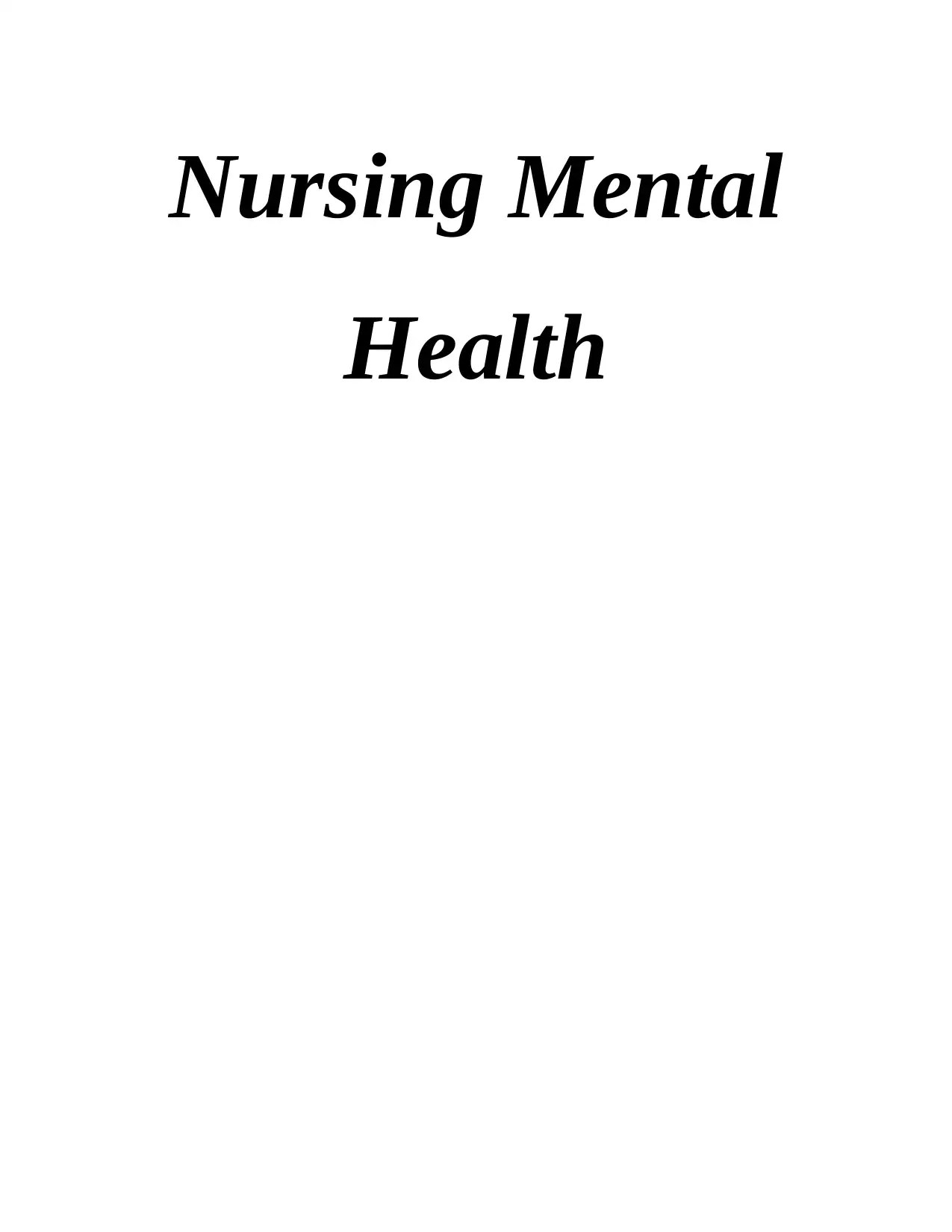
Nursing Mental
Health
Health
Paraphrase This Document
Need a fresh take? Get an instant paraphrase of this document with our AI Paraphraser
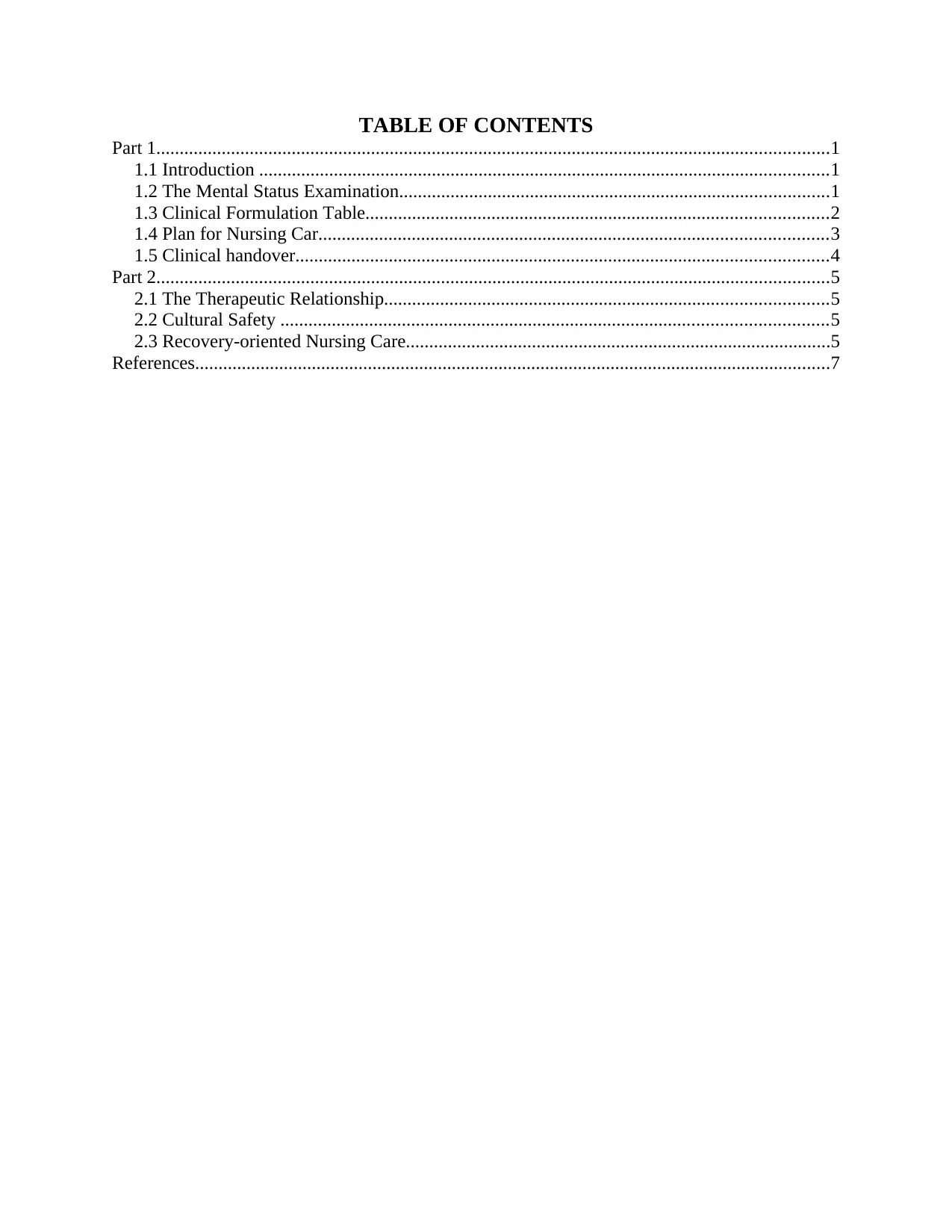
TABLE OF CONTENTS
Part 1................................................................................................................................................1
1.1 Introduction ..........................................................................................................................1
1.2 The Mental Status Examination............................................................................................1
1.3 Clinical Formulation Table...................................................................................................2
1.4 Plan for Nursing Car.............................................................................................................3
1.5 Clinical handover..................................................................................................................4
Part 2................................................................................................................................................5
2.1 The Therapeutic Relationship...............................................................................................5
2.2 Cultural Safety .....................................................................................................................5
2.3 Recovery-oriented Nursing Care...........................................................................................5
References........................................................................................................................................7
Part 1................................................................................................................................................1
1.1 Introduction ..........................................................................................................................1
1.2 The Mental Status Examination............................................................................................1
1.3 Clinical Formulation Table...................................................................................................2
1.4 Plan for Nursing Car.............................................................................................................3
1.5 Clinical handover..................................................................................................................4
Part 2................................................................................................................................................5
2.1 The Therapeutic Relationship...............................................................................................5
2.2 Cultural Safety .....................................................................................................................5
2.3 Recovery-oriented Nursing Care...........................................................................................5
References........................................................................................................................................7
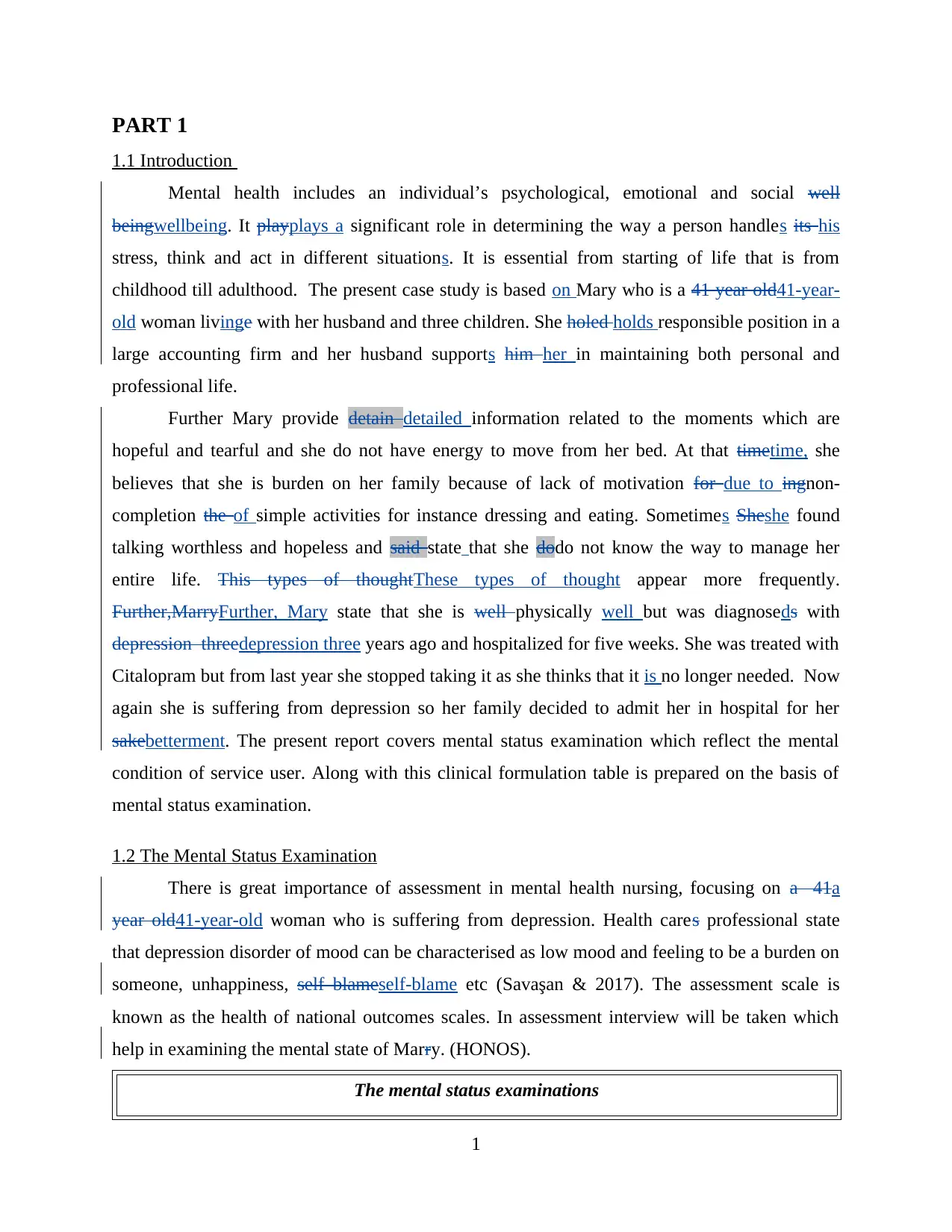
PART 1
1.1 Introduction
Mental health includes an individual’s psychological, emotional and social well
beingwellbeing. It playplays a significant role in determining the way a person handles its his
stress, think and act in different situations. It is essential from starting of life that is from
childhood till adulthood. The present case study is based on Mary who is a 41 year old41-year-
old woman livinge with her husband and three children. She holed holds responsible position in a
large accounting firm and her husband supports him her in maintaining both personal and
professional life.
Further Mary provide detain detailed information related to the moments which are
hopeful and tearful and she do not have energy to move from her bed. At that timetime, she
believes that she is burden on her family because of lack of motivation for due to ingnon-
completion the of simple activities for instance dressing and eating. Sometimes Sheshe found
talking worthless and hopeless and said state that she dodo not know the way to manage her
entire life. This types of thoughtThese types of thought appear more frequently.
Further,MarryFurther, Mary state that she is well physically well but was diagnoseds with
depression threedepression three years ago and hospitalized for five weeks. She was treated with
Citalopram but from last year she stopped taking it as she thinks that it is no longer needed. Now
again she is suffering from depression so her family decided to admit her in hospital for her
sakebetterment. The present report covers mental status examination which reflect the mental
condition of service user. Along with this clinical formulation table is prepared on the basis of
mental status examination.
1.2 The Mental Status Examination
There is great importance of assessment in mental health nursing, focusing on a 41a
year old41-year-old woman who is suffering from depression. Health cares professional state
that depression disorder of mood can be characterised as low mood and feeling to be a burden on
someone, unhappiness, self blameself-blame etc (Savaşan & 2017). The assessment scale is
known as the health of national outcomes scales. In assessment interview will be taken which
help in examining the mental state of Marry. (HONOS).
The mental status examinations
1
1.1 Introduction
Mental health includes an individual’s psychological, emotional and social well
beingwellbeing. It playplays a significant role in determining the way a person handles its his
stress, think and act in different situations. It is essential from starting of life that is from
childhood till adulthood. The present case study is based on Mary who is a 41 year old41-year-
old woman livinge with her husband and three children. She holed holds responsible position in a
large accounting firm and her husband supports him her in maintaining both personal and
professional life.
Further Mary provide detain detailed information related to the moments which are
hopeful and tearful and she do not have energy to move from her bed. At that timetime, she
believes that she is burden on her family because of lack of motivation for due to ingnon-
completion the of simple activities for instance dressing and eating. Sometimes Sheshe found
talking worthless and hopeless and said state that she dodo not know the way to manage her
entire life. This types of thoughtThese types of thought appear more frequently.
Further,MarryFurther, Mary state that she is well physically well but was diagnoseds with
depression threedepression three years ago and hospitalized for five weeks. She was treated with
Citalopram but from last year she stopped taking it as she thinks that it is no longer needed. Now
again she is suffering from depression so her family decided to admit her in hospital for her
sakebetterment. The present report covers mental status examination which reflect the mental
condition of service user. Along with this clinical formulation table is prepared on the basis of
mental status examination.
1.2 The Mental Status Examination
There is great importance of assessment in mental health nursing, focusing on a 41a
year old41-year-old woman who is suffering from depression. Health cares professional state
that depression disorder of mood can be characterised as low mood and feeling to be a burden on
someone, unhappiness, self blameself-blame etc (Savaşan & 2017). The assessment scale is
known as the health of national outcomes scales. In assessment interview will be taken which
help in examining the mental state of Marry. (HONOS).
The mental status examinations
1
⊘ This is a preview!⊘
Do you want full access?
Subscribe today to unlock all pages.

Trusted by 1+ million students worldwide
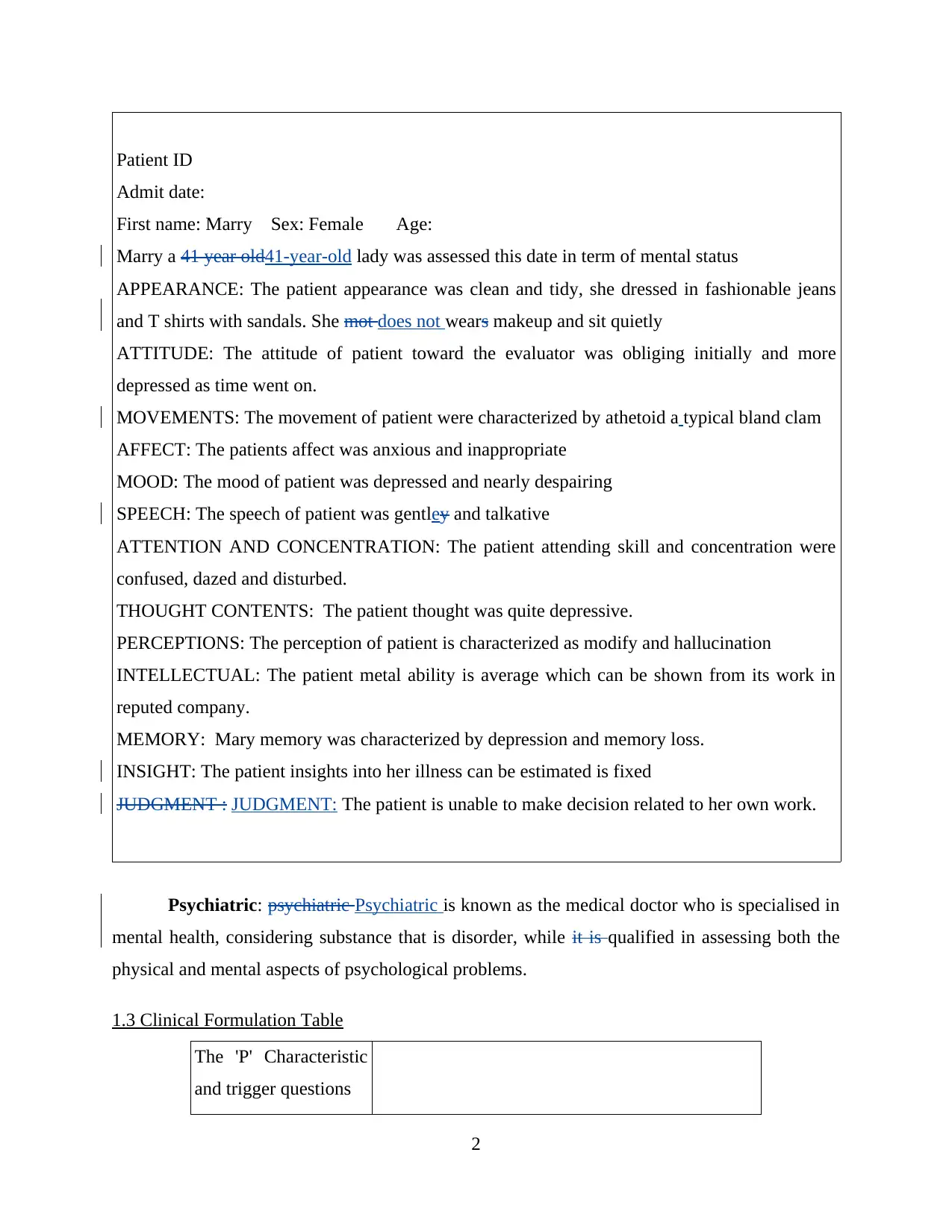
Patient ID
Admit date:
First name: Marry Sex: Female Age:
Marry a 41 year old41-year-old lady was assessed this date in term of mental status
APPEARANCE: The patient appearance was clean and tidy, she dressed in fashionable jeans
and T shirts with sandals. She mot does not wears makeup and sit quietly
ATTITUDE: The attitude of patient toward the evaluator was obliging initially and more
depressed as time went on.
MOVEMENTS: The movement of patient were characterized by athetoid a typical bland clam
AFFECT: The patients affect was anxious and inappropriate
MOOD: The mood of patient was depressed and nearly despairing
SPEECH: The speech of patient was gentley and talkative
ATTENTION AND CONCENTRATION: The patient attending skill and concentration were
confused, dazed and disturbed.
THOUGHT CONTENTS: The patient thought was quite depressive.
PERCEPTIONS: The perception of patient is characterized as modify and hallucination
INTELLECTUAL: The patient metal ability is average which can be shown from its work in
reputed company.
MEMORY: Mary memory was characterized by depression and memory loss.
INSIGHT: The patient insights into her illness can be estimated is fixed
JUDGMENT : JUDGMENT: The patient is unable to make decision related to her own work.
Psychiatric: psychiatric Psychiatric is known as the medical doctor who is specialised in
mental health, considering substance that is disorder, while it is qualified in assessing both the
physical and mental aspects of psychological problems.
1.3 Clinical Formulation Table
The 'P' Characteristic
and trigger questions
2
Admit date:
First name: Marry Sex: Female Age:
Marry a 41 year old41-year-old lady was assessed this date in term of mental status
APPEARANCE: The patient appearance was clean and tidy, she dressed in fashionable jeans
and T shirts with sandals. She mot does not wears makeup and sit quietly
ATTITUDE: The attitude of patient toward the evaluator was obliging initially and more
depressed as time went on.
MOVEMENTS: The movement of patient were characterized by athetoid a typical bland clam
AFFECT: The patients affect was anxious and inappropriate
MOOD: The mood of patient was depressed and nearly despairing
SPEECH: The speech of patient was gentley and talkative
ATTENTION AND CONCENTRATION: The patient attending skill and concentration were
confused, dazed and disturbed.
THOUGHT CONTENTS: The patient thought was quite depressive.
PERCEPTIONS: The perception of patient is characterized as modify and hallucination
INTELLECTUAL: The patient metal ability is average which can be shown from its work in
reputed company.
MEMORY: Mary memory was characterized by depression and memory loss.
INSIGHT: The patient insights into her illness can be estimated is fixed
JUDGMENT : JUDGMENT: The patient is unable to make decision related to her own work.
Psychiatric: psychiatric Psychiatric is known as the medical doctor who is specialised in
mental health, considering substance that is disorder, while it is qualified in assessing both the
physical and mental aspects of psychological problems.
1.3 Clinical Formulation Table
The 'P' Characteristic
and trigger questions
2
Paraphrase This Document
Need a fresh take? Get an instant paraphrase of this document with our AI Paraphraser
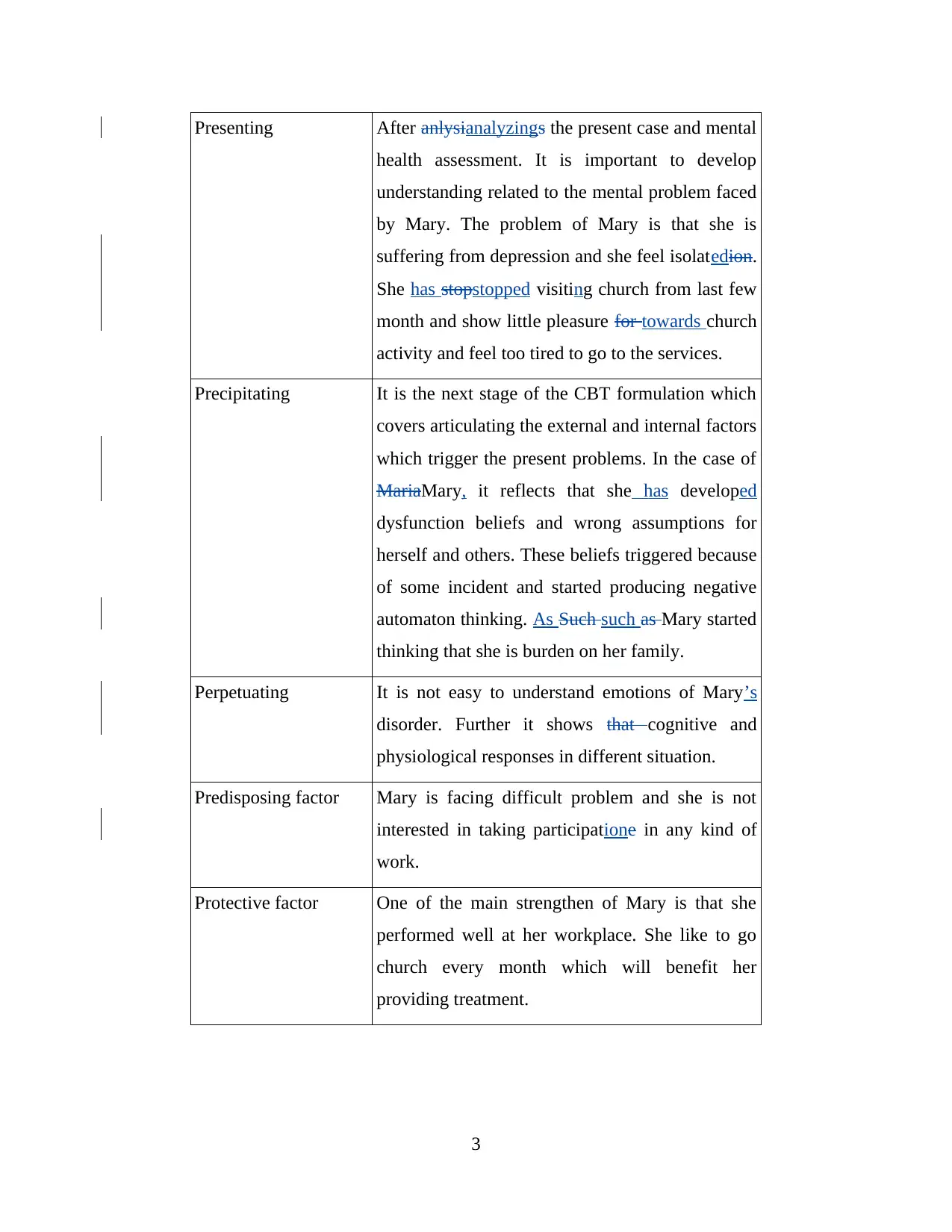
Presenting After anlysianalyzings the present case and mental
health assessment. It is important to develop
understanding related to the mental problem faced
by Mary. The problem of Mary is that she is
suffering from depression and she feel isolatedion.
She has stopstopped visiting church from last few
month and show little pleasure for towards church
activity and feel too tired to go to the services.
Precipitating It is the next stage of the CBT formulation which
covers articulating the external and internal factors
which trigger the present problems. In the case of
MariaMary, it reflects that she has developed
dysfunction beliefs and wrong assumptions for
herself and others. These beliefs triggered because
of some incident and started producing negative
automaton thinking. As Such such as Mary started
thinking that she is burden on her family.
Perpetuating It is not easy to understand emotions of Mary’s
disorder. Further it shows that cognitive and
physiological responses in different situation.
Predisposing factor Mary is facing difficult problem and she is not
interested in taking participatione in any kind of
work.
Protective factor One of the main strengthen of Mary is that she
performed well at her workplace. She like to go
church every month which will benefit her
providing treatment.
3
health assessment. It is important to develop
understanding related to the mental problem faced
by Mary. The problem of Mary is that she is
suffering from depression and she feel isolatedion.
She has stopstopped visiting church from last few
month and show little pleasure for towards church
activity and feel too tired to go to the services.
Precipitating It is the next stage of the CBT formulation which
covers articulating the external and internal factors
which trigger the present problems. In the case of
MariaMary, it reflects that she has developed
dysfunction beliefs and wrong assumptions for
herself and others. These beliefs triggered because
of some incident and started producing negative
automaton thinking. As Such such as Mary started
thinking that she is burden on her family.
Perpetuating It is not easy to understand emotions of Mary’s
disorder. Further it shows that cognitive and
physiological responses in different situation.
Predisposing factor Mary is facing difficult problem and she is not
interested in taking participatione in any kind of
work.
Protective factor One of the main strengthen of Mary is that she
performed well at her workplace. She like to go
church every month which will benefit her
providing treatment.
3
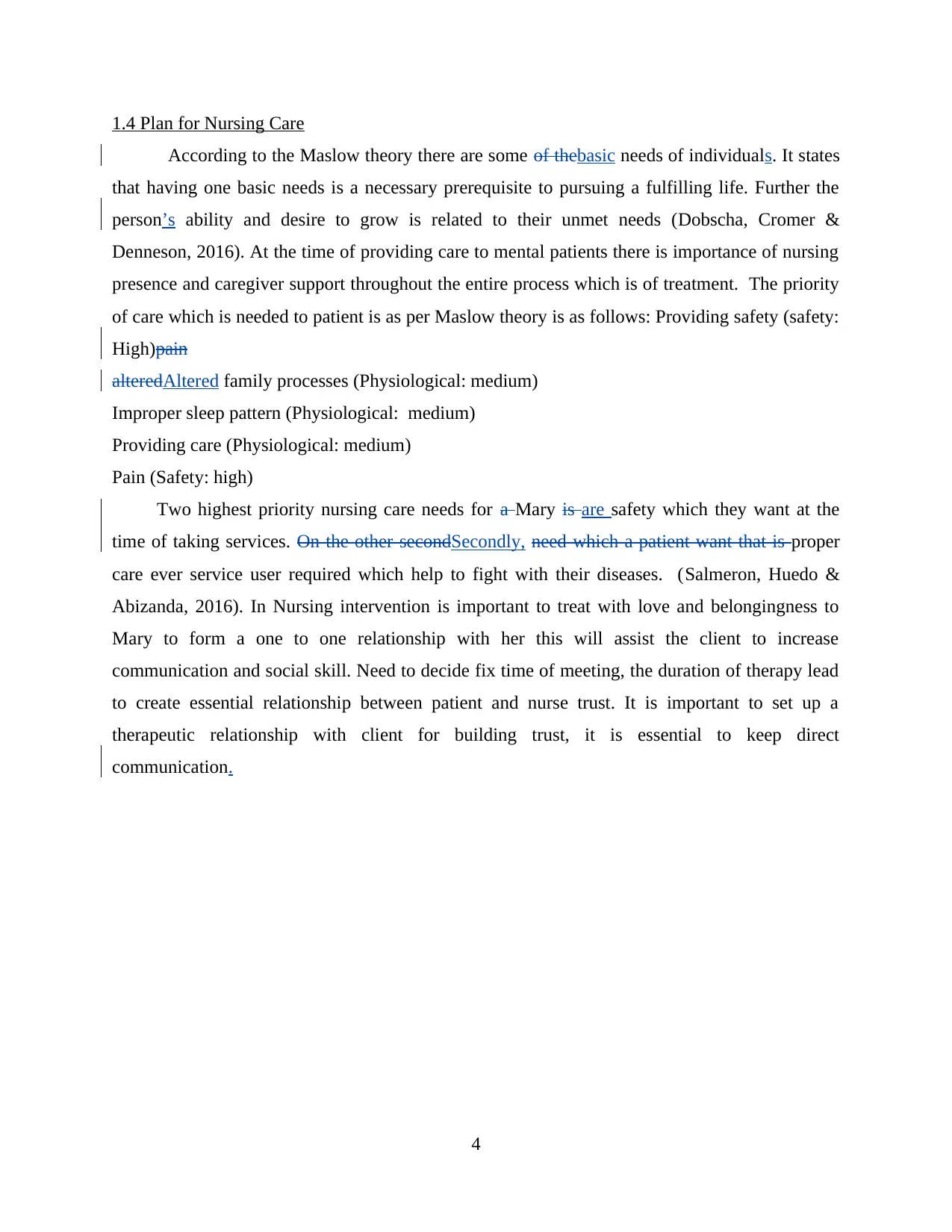
1.4 Plan for Nursing Care
According to the Maslow theory there are some of thebasic needs of individuals. It states
that having one basic needs is a necessary prerequisite to pursuing a fulfilling life. Further the
person’s ability and desire to grow is related to their unmet needs (Dobscha, Cromer &
Denneson, 2016). At the time of providing care to mental patients there is importance of nursing
presence and caregiver support throughout the entire process which is of treatment. The priority
of care which is needed to patient is as per Maslow theory is as follows: Providing safety (safety:
High)pain
alteredAltered family processes (Physiological: medium)
Improper sleep pattern (Physiological: medium)
Providing care (Physiological: medium)
Pain (Safety: high)
Two highest priority nursing care needs for a Mary is are safety which they want at the
time of taking services. On the other secondSecondly, need which a patient want that is proper
care ever service user required which help to fight with their diseases. (Salmeron, Huedo &
Abizanda, 2016). In Nursing intervention is important to treat with love and belongingness to
Mary to form a one to one relationship with her this will assist the client to increase
communication and social skill. Need to decide fix time of meeting, the duration of therapy lead
to create essential relationship between patient and nurse trust. It is important to set up a
therapeutic relationship with client for building trust, it is essential to keep direct
communication.
4
According to the Maslow theory there are some of thebasic needs of individuals. It states
that having one basic needs is a necessary prerequisite to pursuing a fulfilling life. Further the
person’s ability and desire to grow is related to their unmet needs (Dobscha, Cromer &
Denneson, 2016). At the time of providing care to mental patients there is importance of nursing
presence and caregiver support throughout the entire process which is of treatment. The priority
of care which is needed to patient is as per Maslow theory is as follows: Providing safety (safety:
High)pain
alteredAltered family processes (Physiological: medium)
Improper sleep pattern (Physiological: medium)
Providing care (Physiological: medium)
Pain (Safety: high)
Two highest priority nursing care needs for a Mary is are safety which they want at the
time of taking services. On the other secondSecondly, need which a patient want that is proper
care ever service user required which help to fight with their diseases. (Salmeron, Huedo &
Abizanda, 2016). In Nursing intervention is important to treat with love and belongingness to
Mary to form a one to one relationship with her this will assist the client to increase
communication and social skill. Need to decide fix time of meeting, the duration of therapy lead
to create essential relationship between patient and nurse trust. It is important to set up a
therapeutic relationship with client for building trust, it is essential to keep direct
communication.
4
⊘ This is a preview!⊘
Do you want full access?
Subscribe today to unlock all pages.

Trusted by 1+ million students worldwide
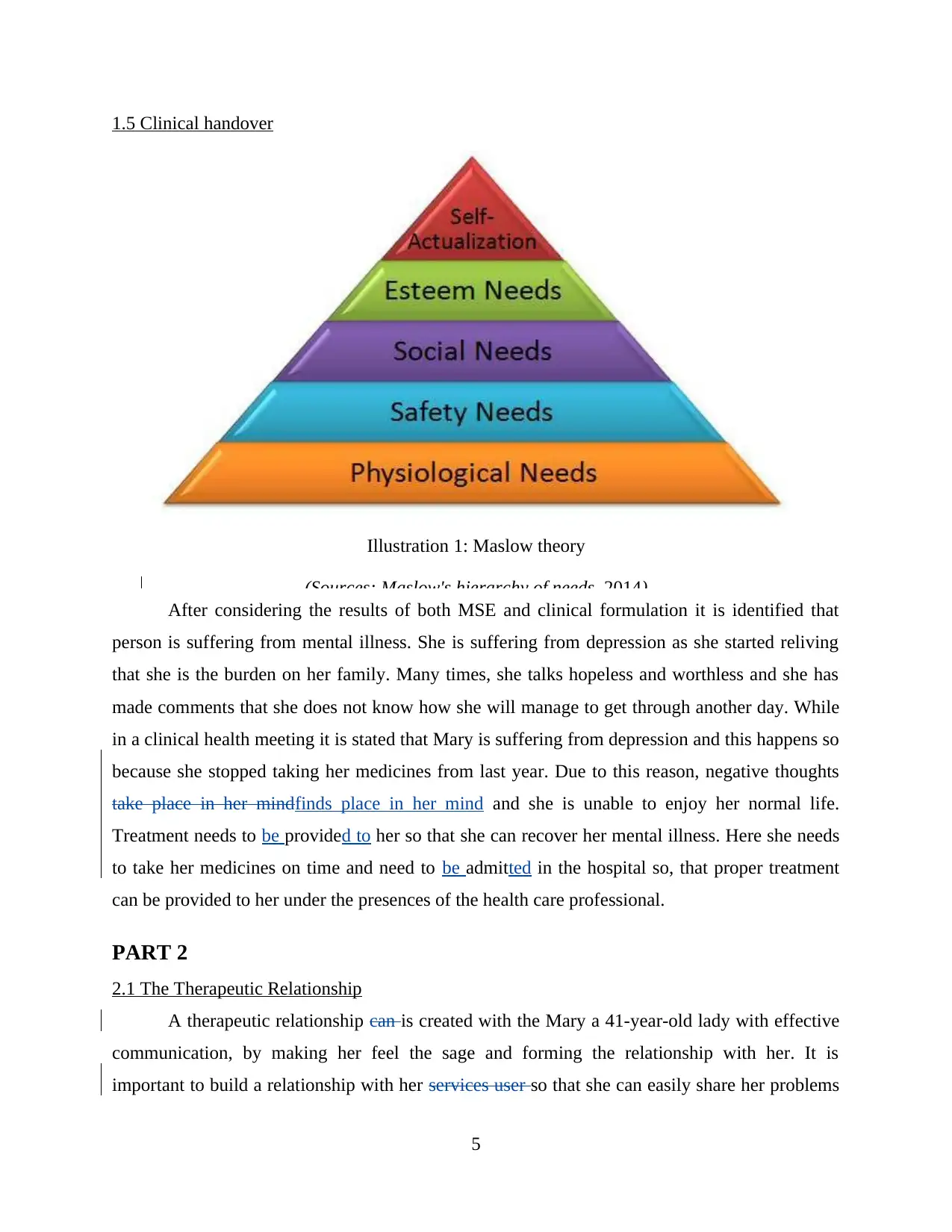
1.5 Clinical handover
After considering the results of both MSE and clinical formulation it is identified that
person is suffering from mental illness. She is suffering from depression as she started reliving
that she is the burden on her family. Many times, she talks hopeless and worthless and she has
made comments that she does not know how she will manage to get through another day. While
in a clinical health meeting it is stated that Mary is suffering from depression and this happens so
because she stopped taking her medicines from last year. Due to this reason, negative thoughts
take place in her mindfinds place in her mind and she is unable to enjoy her normal life.
Treatment needs to be provided to her so that she can recover her mental illness. Here she needs
to take her medicines on time and need to be admitted in the hospital so, that proper treatment
can be provided to her under the presences of the health care professional.
PART 2
2.1 The Therapeutic Relationship
A therapeutic relationship can is created with the Mary a 41-year-old lady with effective
communication, by making her feel the sage and forming the relationship with her. It is
important to build a relationship with her services user so that she can easily share her problems
5
Illustration 1: Maslow theory
(Sources: Maslow's hierarchy of needs, 2014)
After considering the results of both MSE and clinical formulation it is identified that
person is suffering from mental illness. She is suffering from depression as she started reliving
that she is the burden on her family. Many times, she talks hopeless and worthless and she has
made comments that she does not know how she will manage to get through another day. While
in a clinical health meeting it is stated that Mary is suffering from depression and this happens so
because she stopped taking her medicines from last year. Due to this reason, negative thoughts
take place in her mindfinds place in her mind and she is unable to enjoy her normal life.
Treatment needs to be provided to her so that she can recover her mental illness. Here she needs
to take her medicines on time and need to be admitted in the hospital so, that proper treatment
can be provided to her under the presences of the health care professional.
PART 2
2.1 The Therapeutic Relationship
A therapeutic relationship can is created with the Mary a 41-year-old lady with effective
communication, by making her feel the sage and forming the relationship with her. It is
important to build a relationship with her services user so that she can easily share her problems
5
Illustration 1: Maslow theory
(Sources: Maslow's hierarchy of needs, 2014)
Paraphrase This Document
Need a fresh take? Get an instant paraphrase of this document with our AI Paraphraser
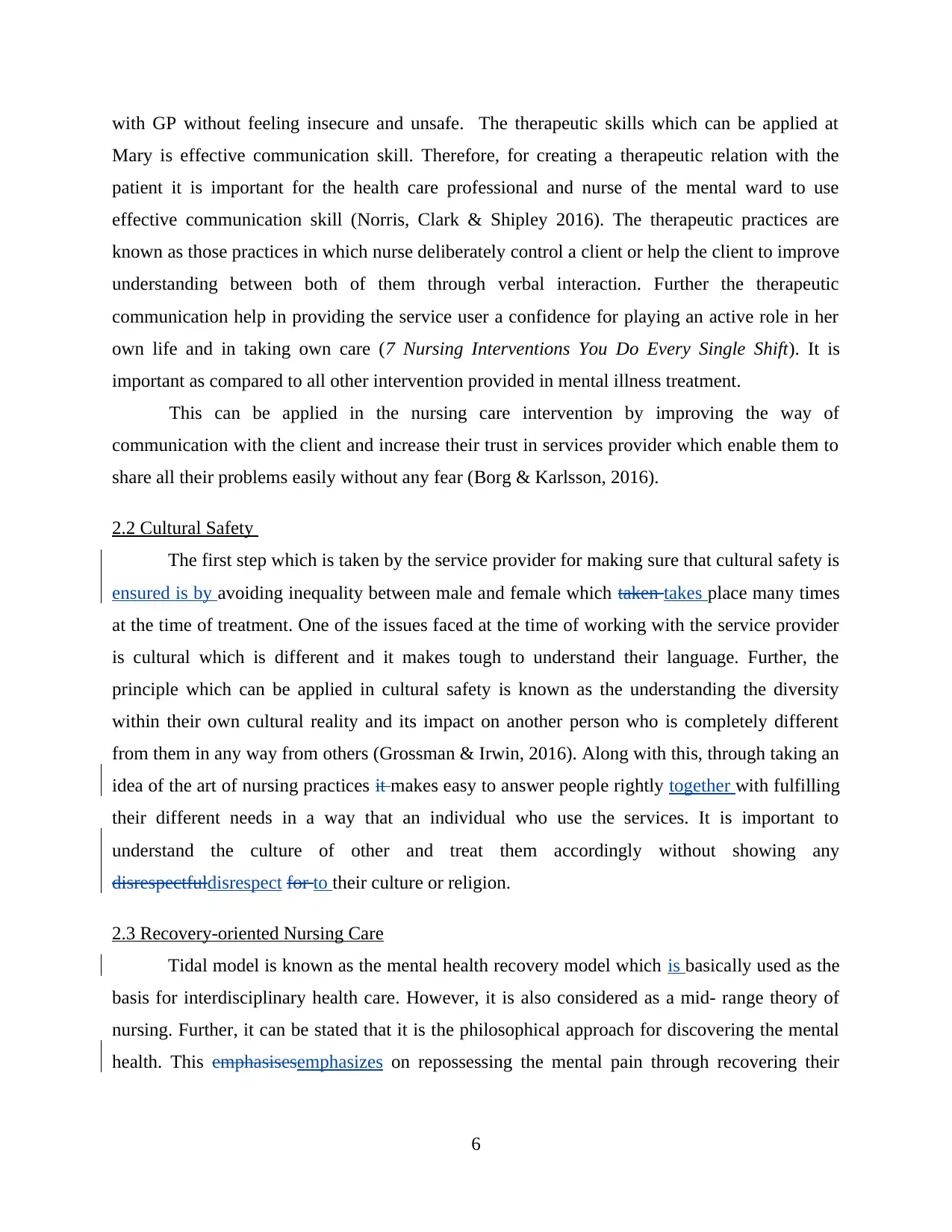
with GP without feeling insecure and unsafe. The therapeutic skills which can be applied at
Mary is effective communication skill. Therefore, for creating a therapeutic relation with the
patient it is important for the health care professional and nurse of the mental ward to use
effective communication skill (Norris, Clark & Shipley 2016). The therapeutic practices are
known as those practices in which nurse deliberately control a client or help the client to improve
understanding between both of them through verbal interaction. Further the therapeutic
communication help in providing the service user a confidence for playing an active role in her
own life and in taking own care (7 Nursing Interventions You Do Every Single Shift). It is
important as compared to all other intervention provided in mental illness treatment.
This can be applied in the nursing care intervention by improving the way of
communication with the client and increase their trust in services provider which enable them to
share all their problems easily without any fear (Borg & Karlsson, 2016).
2.2 Cultural Safety
The first step which is taken by the service provider for making sure that cultural safety is
ensured is by avoiding inequality between male and female which taken takes place many times
at the time of treatment. One of the issues faced at the time of working with the service provider
is cultural which is different and it makes tough to understand their language. Further, the
principle which can be applied in cultural safety is known as the understanding the diversity
within their own cultural reality and its impact on another person who is completely different
from them in any way from others (Grossman & Irwin, 2016). Along with this, through taking an
idea of the art of nursing practices it makes easy to answer people rightly together with fulfilling
their different needs in a way that an individual who use the services. It is important to
understand the culture of other and treat them accordingly without showing any
disrespectfuldisrespect for to their culture or religion.
2.3 Recovery-oriented Nursing Care
Tidal model is known as the mental health recovery model which is basically used as the
basis for interdisciplinary health care. However, it is also considered as a mid- range theory of
nursing. Further, it can be stated that it is the philosophical approach for discovering the mental
health. This emphasisesemphasizes on repossessing the mental pain through recovering their
6
Mary is effective communication skill. Therefore, for creating a therapeutic relation with the
patient it is important for the health care professional and nurse of the mental ward to use
effective communication skill (Norris, Clark & Shipley 2016). The therapeutic practices are
known as those practices in which nurse deliberately control a client or help the client to improve
understanding between both of them through verbal interaction. Further the therapeutic
communication help in providing the service user a confidence for playing an active role in her
own life and in taking own care (7 Nursing Interventions You Do Every Single Shift). It is
important as compared to all other intervention provided in mental illness treatment.
This can be applied in the nursing care intervention by improving the way of
communication with the client and increase their trust in services provider which enable them to
share all their problems easily without any fear (Borg & Karlsson, 2016).
2.2 Cultural Safety
The first step which is taken by the service provider for making sure that cultural safety is
ensured is by avoiding inequality between male and female which taken takes place many times
at the time of treatment. One of the issues faced at the time of working with the service provider
is cultural which is different and it makes tough to understand their language. Further, the
principle which can be applied in cultural safety is known as the understanding the diversity
within their own cultural reality and its impact on another person who is completely different
from them in any way from others (Grossman & Irwin, 2016). Along with this, through taking an
idea of the art of nursing practices it makes easy to answer people rightly together with fulfilling
their different needs in a way that an individual who use the services. It is important to
understand the culture of other and treat them accordingly without showing any
disrespectfuldisrespect for to their culture or religion.
2.3 Recovery-oriented Nursing Care
Tidal model is known as the mental health recovery model which is basically used as the
basis for interdisciplinary health care. However, it is also considered as a mid- range theory of
nursing. Further, it can be stated that it is the philosophical approach for discovering the mental
health. This emphasisesemphasizes on repossessing the mental pain through recovering their
6
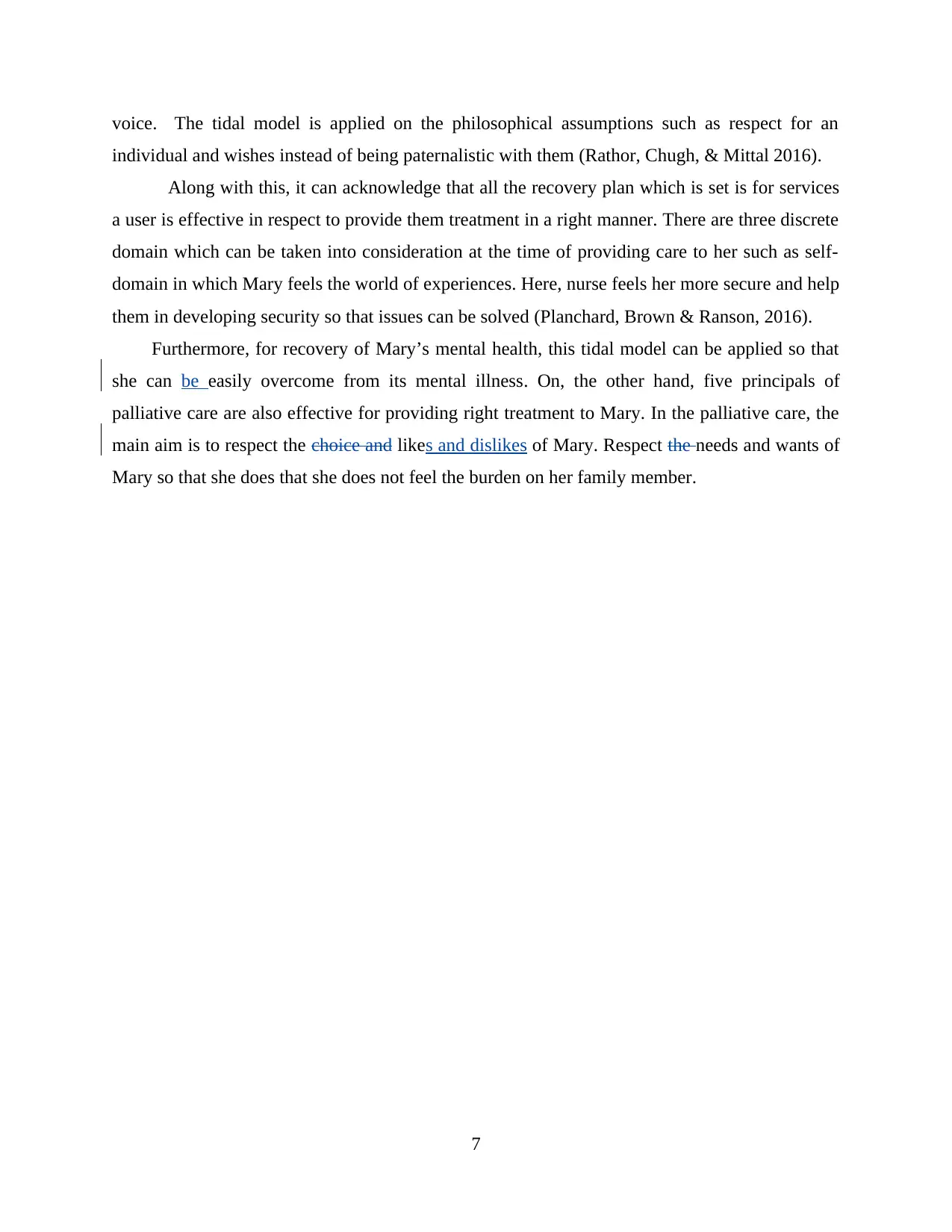
voice. The tidal model is applied on the philosophical assumptions such as respect for an
individual and wishes instead of being paternalistic with them (Rathor, Chugh, & Mittal 2016).
Along with this, it can acknowledge that all the recovery plan which is set is for services
a user is effective in respect to provide them treatment in a right manner. There are three discrete
domain which can be taken into consideration at the time of providing care to her such as self-
domain in which Mary feels the world of experiences. Here, nurse feels her more secure and help
them in developing security so that issues can be solved (Planchard, Brown & Ranson, 2016).
Furthermore, for recovery of Mary’s mental health, this tidal model can be applied so that
she can be easily overcome from its mental illness. On, the other hand, five principals of
palliative care are also effective for providing right treatment to Mary. In the palliative care, the
main aim is to respect the choice and likes and dislikes of Mary. Respect the needs and wants of
Mary so that she does that she does not feel the burden on her family member.
7
individual and wishes instead of being paternalistic with them (Rathor, Chugh, & Mittal 2016).
Along with this, it can acknowledge that all the recovery plan which is set is for services
a user is effective in respect to provide them treatment in a right manner. There are three discrete
domain which can be taken into consideration at the time of providing care to her such as self-
domain in which Mary feels the world of experiences. Here, nurse feels her more secure and help
them in developing security so that issues can be solved (Planchard, Brown & Ranson, 2016).
Furthermore, for recovery of Mary’s mental health, this tidal model can be applied so that
she can be easily overcome from its mental illness. On, the other hand, five principals of
palliative care are also effective for providing right treatment to Mary. In the palliative care, the
main aim is to respect the choice and likes and dislikes of Mary. Respect the needs and wants of
Mary so that she does that she does not feel the burden on her family member.
7
⊘ This is a preview!⊘
Do you want full access?
Subscribe today to unlock all pages.

Trusted by 1+ million students worldwide
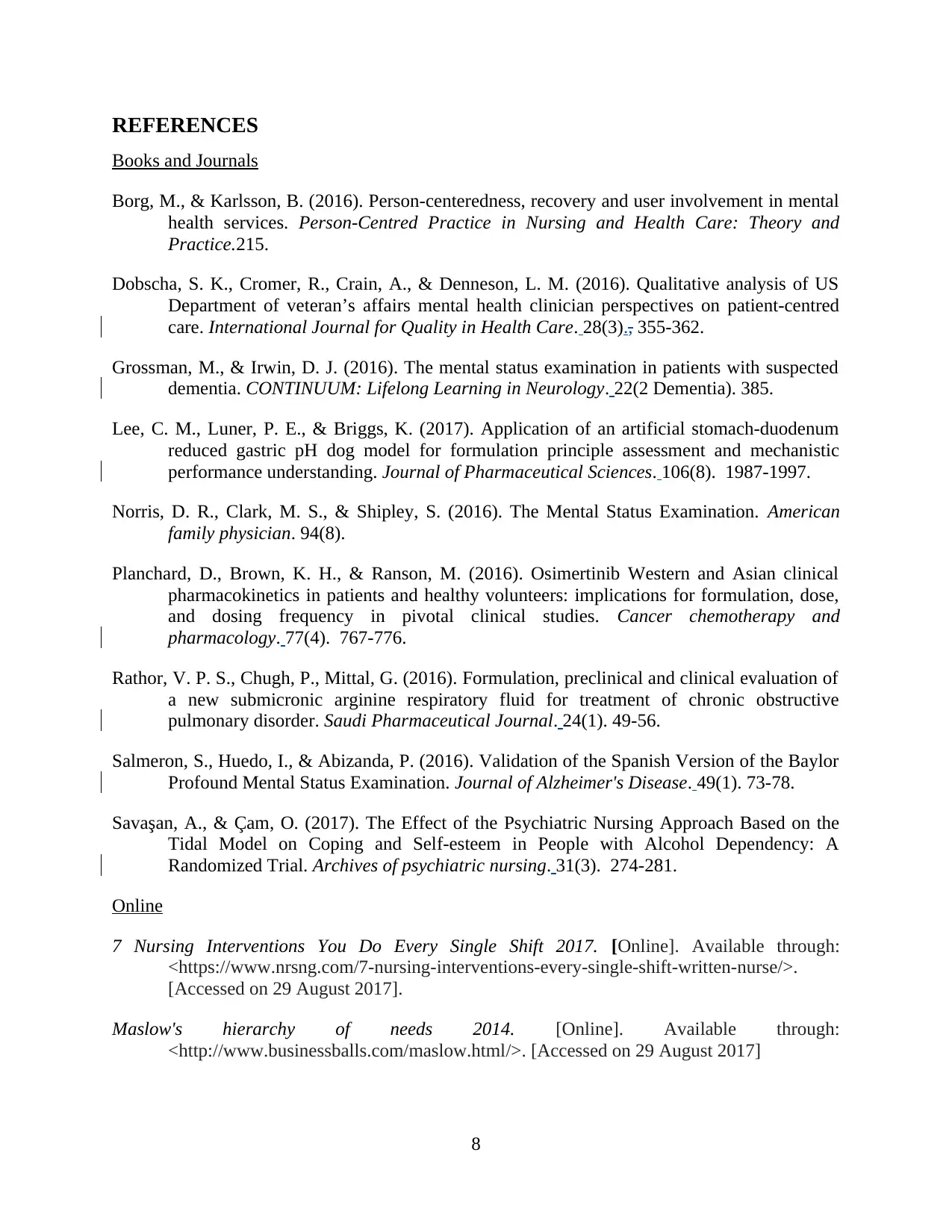
REFERENCES
Books and Journals
Borg, M., & Karlsson, B. (2016). Person-centeredness, recovery and user involvement in mental
health services. Person-Centred Practice in Nursing and Health Care: Theory and
Practice.215.
Dobscha, S. K., Cromer, R., Crain, A., & Denneson, L. M. (2016). Qualitative analysis of US
Department of veteran’s affairs mental health clinician perspectives on patient-centred
care. International Journal for Quality in Health Care. 28(3)., 355-362.
Grossman, M., & Irwin, D. J. (2016). The mental status examination in patients with suspected
dementia. CONTINUUM: Lifelong Learning in Neurology. 22(2 Dementia). 385.
Lee, C. M., Luner, P. E., & Briggs, K. (2017). Application of an artificial stomach-duodenum
reduced gastric pH dog model for formulation principle assessment and mechanistic
performance understanding. Journal of Pharmaceutical Sciences. 106(8). 1987-1997.
Norris, D. R., Clark, M. S., & Shipley, S. (2016). The Mental Status Examination. American
family physician. 94(8).
Planchard, D., Brown, K. H., & Ranson, M. (2016). Osimertinib Western and Asian clinical
pharmacokinetics in patients and healthy volunteers: implications for formulation, dose,
and dosing frequency in pivotal clinical studies. Cancer chemotherapy and
pharmacology. 77(4). 767-776.
Rathor, V. P. S., Chugh, P., Mittal, G. (2016). Formulation, preclinical and clinical evaluation of
a new submicronic arginine respiratory fluid for treatment of chronic obstructive
pulmonary disorder. Saudi Pharmaceutical Journal. 24(1). 49-56.
Salmeron, S., Huedo, I., & Abizanda, P. (2016). Validation of the Spanish Version of the Baylor
Profound Mental Status Examination. Journal of Alzheimer's Disease. 49(1). 73-78.
Savaşan, A., & Çam, O. (2017). The Effect of the Psychiatric Nursing Approach Based on the
Tidal Model on Coping and Self-esteem in People with Alcohol Dependency: A
Randomized Trial. Archives of psychiatric nursing. 31(3). 274-281.
Online
7 Nursing Interventions You Do Every Single Shift 2017. [Online]. Available through:
<https://www.nrsng.com/7-nursing-interventions-every-single-shift-written-nurse/>.
[Accessed on 29 August 2017].
Maslow's hierarchy of needs 2014. [Online]. Available through:
<http://www.businessballs.com/maslow.html/>. [Accessed on 29 August 2017]
8
Books and Journals
Borg, M., & Karlsson, B. (2016). Person-centeredness, recovery and user involvement in mental
health services. Person-Centred Practice in Nursing and Health Care: Theory and
Practice.215.
Dobscha, S. K., Cromer, R., Crain, A., & Denneson, L. M. (2016). Qualitative analysis of US
Department of veteran’s affairs mental health clinician perspectives on patient-centred
care. International Journal for Quality in Health Care. 28(3)., 355-362.
Grossman, M., & Irwin, D. J. (2016). The mental status examination in patients with suspected
dementia. CONTINUUM: Lifelong Learning in Neurology. 22(2 Dementia). 385.
Lee, C. M., Luner, P. E., & Briggs, K. (2017). Application of an artificial stomach-duodenum
reduced gastric pH dog model for formulation principle assessment and mechanistic
performance understanding. Journal of Pharmaceutical Sciences. 106(8). 1987-1997.
Norris, D. R., Clark, M. S., & Shipley, S. (2016). The Mental Status Examination. American
family physician. 94(8).
Planchard, D., Brown, K. H., & Ranson, M. (2016). Osimertinib Western and Asian clinical
pharmacokinetics in patients and healthy volunteers: implications for formulation, dose,
and dosing frequency in pivotal clinical studies. Cancer chemotherapy and
pharmacology. 77(4). 767-776.
Rathor, V. P. S., Chugh, P., Mittal, G. (2016). Formulation, preclinical and clinical evaluation of
a new submicronic arginine respiratory fluid for treatment of chronic obstructive
pulmonary disorder. Saudi Pharmaceutical Journal. 24(1). 49-56.
Salmeron, S., Huedo, I., & Abizanda, P. (2016). Validation of the Spanish Version of the Baylor
Profound Mental Status Examination. Journal of Alzheimer's Disease. 49(1). 73-78.
Savaşan, A., & Çam, O. (2017). The Effect of the Psychiatric Nursing Approach Based on the
Tidal Model on Coping and Self-esteem in People with Alcohol Dependency: A
Randomized Trial. Archives of psychiatric nursing. 31(3). 274-281.
Online
7 Nursing Interventions You Do Every Single Shift 2017. [Online]. Available through:
<https://www.nrsng.com/7-nursing-interventions-every-single-shift-written-nurse/>.
[Accessed on 29 August 2017].
Maslow's hierarchy of needs 2014. [Online]. Available through:
<http://www.businessballs.com/maslow.html/>. [Accessed on 29 August 2017]
8
1 out of 10
Related Documents
Your All-in-One AI-Powered Toolkit for Academic Success.
+13062052269
info@desklib.com
Available 24*7 on WhatsApp / Email
![[object Object]](/_next/static/media/star-bottom.7253800d.svg)
Unlock your academic potential
Copyright © 2020–2026 A2Z Services. All Rights Reserved. Developed and managed by ZUCOL.





